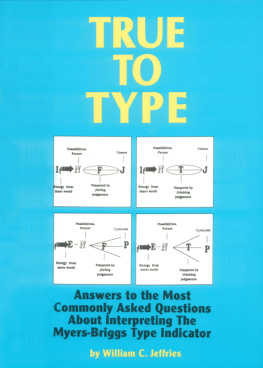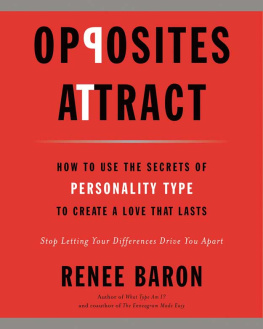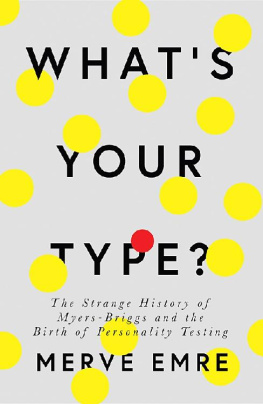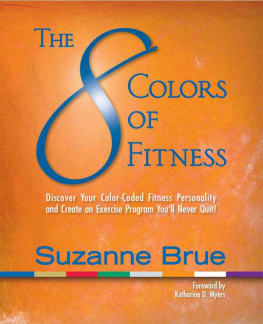
MBTI and the Myers-Briggs Type Indicator are registered trademarks
of Consulting Psychologists Press, Palo Alto, California. Typo-o-graphics are a trademark of FarCreations. Diagrams and concepts are used with their permission.
Copyright 1991 by William C. Jeffries
All rights reserved, including the right to reproduce this work or portions thereof in any form whatsoever without permission in writing from the publisher, except for brief passages in connection with a review.
For information, write:
Hampton Roads Publishing Company, Inc.
1125 Stoney Ridge Road
Charlottesville, VA 22902
e-mail:
www.hrpub.com
Or call: (804) 296-2772
FAX: (804) 296-5096
If you are unable to order this book from your local bookseller, you may order directly from the publisher. Quantity discounts for organizations are available.
Call 1-800-766-8009, toll-free.
14 13 12 11 10
ISBN 1-878901-08-7
Printed in Canada
www.redwheelweiser.com
www.redwheelweiser.com/newsletter
ACKNOWLEDGEMENTS
Anyone writing today about the MBTI or psychological type has a host of predecessors whose collective wisdom has informed their ideas. I am particularly thankful to Katharine C. Briggs and Isabel Briggs Myers for bringing the theory of type to life and to Dr. Mary H. McCaulley for having done so much in her lifetime to perpetuate the authors' ideas and to work to help establish the intellectual and professional credibility of the theory through her research.
I also owe a special debt of gratitude to several people who have read my manuscript and contributed suggestions, ideas, and anecdotes. Others have offered me encouragement to pursue this project as a necessary contribution to our ongoing understanding of psychological type and its ethical use. Dr. Leonard D. Goodstein and Judith Noel in particular have helped me to refine both ideas and methods of presentation. Otto Kroeger was an early mentor and ignited my interest in psychological type. I am also indebted to Frank DeMarco for his careful reading of my text before its publication. To these and countless others, mostly colleagues, friends, clients, and students with whom I have worked, I say: Thank-you.
William C. Jeffries, INTJ
for my children, Tiffany, Ainsley, and Joshua, who every day remind me of the beauty, power, and richness of diversity in our lives.
Thank you
TABLE OF CONTENTS
INDEX TO QUESTIONS
1. Where do our preferences come from?
Page
2. I've heard some people talk about True Type. How does that differ from my Myers-Briggs Type?
Page
3. How reliable are my results?
Page
4. If my colleague and I are the same type, why are we so different?
Page
5. Can I change my type?
Page
6. I'm a very different person at home from the person I am on the job. How does your theory and data explain that?
Page
7. Is type related to horoscope?
Page
8. Why do we have to pick between just two answers, (A) or (B)?
Page
9. I couldn't answer some of the questions. Will my results still be usable?
Page
10. Why do many Jungians reject the J-P preference on the MBTI?
Page
11. Why do several questions seem to ask the same thing?
Page
12. Are intuitives more creative than sensors?
Page
13. What do very high scores or very low scores indicate about a person? Which is better?
Page
14. I thought balance was an important issue in psychological type. Now you seem to be saying that balance between preferences is not desirable. Please explain.
Page
15. Can the MBTI be used for psychologically disturbed people?
Page
16. Don't TJs make the best top-level managers?
Page
17. How effective can the MBTI be in reflecting the Types of individuals from different cultures or nationalities?
Page
18. What are word pairs and why do some people report this data to the client?
Page
19. My preference for introversion has gotten stronger the older I have become. Is that unusual?
Page
20. Are there any discernible racial differences or patterns reflected in our types?
Page
21. Some consultants use letter combinations of ST, SF, NF, & NT. Others use SJ and SP in lieu of ST & SF. What is the difference?
Page
22. What is meant by falsification of type?
Page
23. What is individuation and how does it differ from or relate to good type development?
Page
24. How does my age affect my type?
Page
25. Why don't some psychologists accept the MBTI as a useful tool?
Page
26. Why do different scales have different maximums?
Page
27. What percentages of the population report each of the preferences?
Page
28. How young can a person be and take the MBTI?
Page
29. Do men and women differ in how they report type?
Page
30. Who besides me gets my results?
Page
31. How can knowing my type or the types of others foster better communications?
Page
32. Which types work together best on a team?
Page
33. If I am under pressure when I fill out the indicator, will my results be valid?
Page
34. Can I tell from their MBTI preferences which of my employees will be honest or dishonest?
Page
35. I know that you have said that there are no good types and no bad types, but, honestly, don't P's procrastinate more than J's?
Page
36. As an ENFP, why do I have such a hard time introducing myself to others or sharing personal insights during presentations? Aren't I supposed to be gregarious and friendly?
Page
37. I hear people talk about working out of their shadow function. What does that mean?
Page
38. How often should I take the MBTI?
Page
39. Can't I come out any type I want to on the MBTI?
Page
40. Is any one of my four letters more important or more influential than the others?
Page
41. Can I use the MBTI to hire the right employee for a job?
Page
42. Should I use my type to choose a career?
Page
43. Does being an F mean that I am more emotional than my T associates?
Page
44. Sixteen letters are a lot to remember. Do you have any tips for remembering what all these letters mean?
Page
45. How am I likely to act in regard to my type when I am under stress?
Page
46. I have seen some recent criticism of the MBTI that suggests that it is little more than a quaint parlor game because all it indicates is positive traits about a person. What do you say?
Page
47. Is there an ideal sequence of events when presenting a feedback session to a group of people?
Page
48. You have discussed a great number of the benefits one derives from taking the MBTI, but what is the downside? What possible negative consequences can occur when organizations use the MBTI?
Page
49. Is there any significance to the order in which the letters in the type formula appear?
Page
50. How can I best describe the MBTI and the associated preferences to an audience? What, exactly, should I use as examples?
Page
PREFACE: OK, I'VE GOT A QUESTION
As I travel from organization to organization, I hear the same questions being raised, often from people who have heard presentations on the MBTI several times. Some of these questions come from individuals who have already attended week-long workshops designed to provide participants with the adequate skills to be recommended as qualified users of the indicator. I could posit hundreds of questions and offer answers based on the Manual (see Bibliography under Myers for this definitive work on the MBTI), other MBTI literature, and my own experience, but instead I have decided to limit the questions to just those I have heard frequently. The arbitrary criterion I have chosen to admit a question to this list is that I must have been asked the same question at least five times over the last year. I can't guarantee that I have given the same answer each time, but these are the answers I have worked toward during my years of presenting the MBTI to audiences around the world.
Next page







